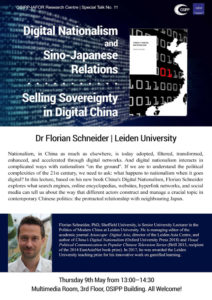Dr Florian Schneider, Senior Lecturer in the Politics of Modern China, Leiden University, delivered the 11th OSIPP-IAFOR Research Centre Special Talk at Osaka School of International Public Policy.
Report of the event from Anoma van der Veere, Researcher (Society & Culture)
 When thinking about nationalism, we tend to think about flag waving and reciting the national anthem while fighting for our country. On Thursday 9 May, Dr Florian Schneider in his talk at OSIPP, actually showed that nationalism comes in many more forms.
When thinking about nationalism, we tend to think about flag waving and reciting the national anthem while fighting for our country. On Thursday 9 May, Dr Florian Schneider in his talk at OSIPP, actually showed that nationalism comes in many more forms.
Dr Schneider, head of the LeidenAsiaCentre at Leiden University and author of the must-read book Digital Nationalism in China, argues that we often practice nationalism in almost unnoticeably small moments while browsing the internet. This can be even just while reading a news article online, or engaging with someone in a discussion on social media.
The internet is a large repository for information that can function in many ways according to how we ourselves use it. Giving the example of how Google "predicts" what we search while we are typing, Dr Schneider explained how digital mechanisms function to make it easier for us to navigate the internet. This way of consuming new information is the same in China, where internet users are confronted with vast amounts of information through search tools, micro-blogging platforms, and messaging software. In fact, a quick comparison of search results of the same keywords in China and Hong Kong already shows how vast the gap can be between the information provided across both physical and digital borders.
In his research, Dr Schneider uses multiple theoretical and methodological tools to support his arguments. In a follow-up workshop later in the day, students were acquainted with how Dr Schneider builds his argument by exploring the roots of a method called discourse analysis. By providing a case-study comparison of how political actors in the United States and in China approach the internet as a concept, students were able to learn how to spot differences in meanings that actors might wish to convey. This took place in conjunction with some good tips on how to confront a writer’s block using digital media.
As the second session concluded, it became clear that Dr Schneider had offered scaffolding for students to start exploring new options for scheduling, thesis planning, and building a good argument in one’s own work.
In summary, students not only learned how to comprehend a complex topic like digital nationalism in China, but also how to explore and bring their own voice while writing on the topic.
This article was originally published here.

